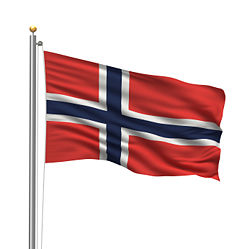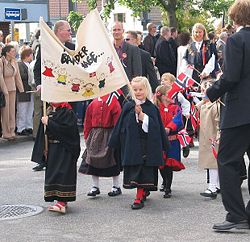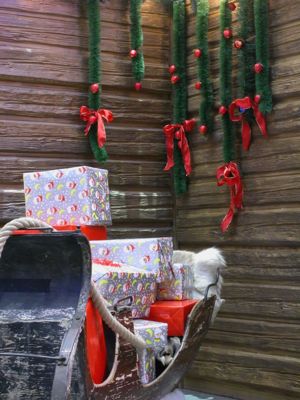Norway Gift Giving Customs
From Giftypedia
Capital: Oslo
Currency: Krone
Language: Norwegian. There are 2 official written forms. Bokmal (Book Norwegian) and Nynorsk (New Norwegian). Bokmal is the more common form.
Giving Gifts In Norway
According to old Norwegian Gulating law, it was stated that a gift should be valued with an equal gift in return. [1]In the old Scandinavian civilization, exchanges and contracts took place in the form of presents, which were voluntary, but were expected to be reciprocated. In today's modern society, the law no longer determines the etiquette of gift giving, but there are certain protocols that are typically observed when giving gifts in Norway.
As a rule, gift giving in Norway is commonplace. Norwegians take every holiday as an opportunity for generous gift giving. The people of Norway are extremely family oriented, and every important holiday is spent at home with their families and close relatives.
Dinner parties are a popular way of gathering here. It is often a good idea to send flowers for the host or hostess on the morning of the dinner party so that they may be set out for the evening. A house plant is also well-received in the winter months, and a bouquet of wildflowers is always appreciated. Wrapped gifts are typically opened when received.
Norwegian Holidays and Celebrations
Constitution Day – May 17 marks the country's most anticipated holiday of the year! Similar to July 4th in the U.S., this holiday commemorates the signing of the constitution which gave Norway it's independence in 1814. Celebrated with costumes, parades and games, children are treated to a bounty of gifts on this day.
Christmas or Yule - Holiday festivities begin weeks before Christmas with the brewing of the Christmas beer (Juleil).[2] Christmas Eve is the day that the spirit of gift-giving comes alive for the Norwegians. Traditional holiday celebrations and feasts are reserved for this day, rather than December 25. But make no mistake - the entire Christmas season is taken seriously here, beginning with the Advent on December 1. Children typically receive an Advent Calendar with a small gift inside each door as they count down the days to Christmas. And Santa Claus, known in Norway as "Julenissen" (the yule elf) has celebrity status, with many towns claiming to be Santa's original home.
New Year's Eve - Famous for it's legendary fireworks display, December 31 is simply a continuation of the Yuletide festivities in this beautiful country. Candies, cookies and oranges are often exchanged as gifts. Colorful costumes, and the singing of carols mark the occasion as well.
Midsummer's Eve – June 23 celebrates the Summer Solstice. In this majestic place near the Arctic Circle, the longest day of the year holds special meaning. Families typically get together for a celebratory feast - that in olden days, wished for a good harvest - and later gather at the beach for bonfires and frivolity. A happy occasion, it is typical that gifts of wine and food be given on this day.
Easter- Despite the dominance of the Christian religion in Norway, Easter is typically considered a fun and whimsical holiday, rather than a serious religious observance. The Easter Bunny does appear, as does the Easter Chicken! Egg hunts entertain the children, while adults will enjoy a day of outdoor sporting activity, such as skiing. Oddly, a popular pastime on this holiday is the reading of crime novels or watching murder mysteries on TV!
Gifts to Avoid
Certain gifts should always be avoided in Norway, and they are typically associated with funerals and/or death. Carnations, lilies or white flowers; even numbers of flowers; and wreaths - even at Christmas - are not welcome.
Giving Business Gifts in Norway
- Norway is not a gift-giving business culture, except for the occasional Christmas present or logo items.
- Upon completion of a successful negotiation, a bottle of quality cognac or whiskey is welcome.
- Make sure your gift is wrapped in quality paper.
- Avoid excessive gift-giving or any other action that can be perceived as a bribe.
- The most successful gift giving practice may be to ask your Norwegian host beforehand if he would like you to bring your tax-free quota when you fly in. Due to high local prices, this will almost certainly be appreciated and accepted.
Norwegian Business Culture[3] [4]
- Appointments are necessary and should be made as far in advance as possible by writing or telephone. Send an agenda in advance as well so your hosts can be prepared.
- Punctuality is imperative. Telephone to notify if you are going to be late; even if it's just a few minutes.
- Meetings are usually rather informal, but allow your Norwegian colleague to initiate the use of first names.
- Norwegians prefer to get to discussions quickly. There is not much small talk. Interruptions are not appreciated.
- Questions are typically saved until after the presentation, which should be precise and concrete.
- Price is often the most important deciding factor during negotiations.
- Maintain eye contact, but keep an arm's length distance from conversational partners at business gatherings. Avoid personal touch, such as arm grabbing or back-slapping.
- Business entertaining is reserved for lunch or dinner – rarely over breakfast. The person who invites is expected to pay the bill.
- Remember to keep alcohol at a minimum.
- Business colleagues are often invited to a local home for a meal. When going to someone's home, it is customary to arrive with flowers, chocolates, pastries or wine.
Related Articles
- International Gift Customs
- How to Avoid Controversial or Inappropriate Gifts
- Etiquette for Office / Business Gift Giving
References
- ↑ EPJournal.net - Gift-giving Behavior in Modern Norwegian Society
- ↑ Museum of Science and Indutry, Chicago - Norway
- ↑ Kwintessential - Global Etiquette/Norway
- ↑ Wow Essays - Norwegian Business Culture




 Printer Friendly
Printer Friendly
